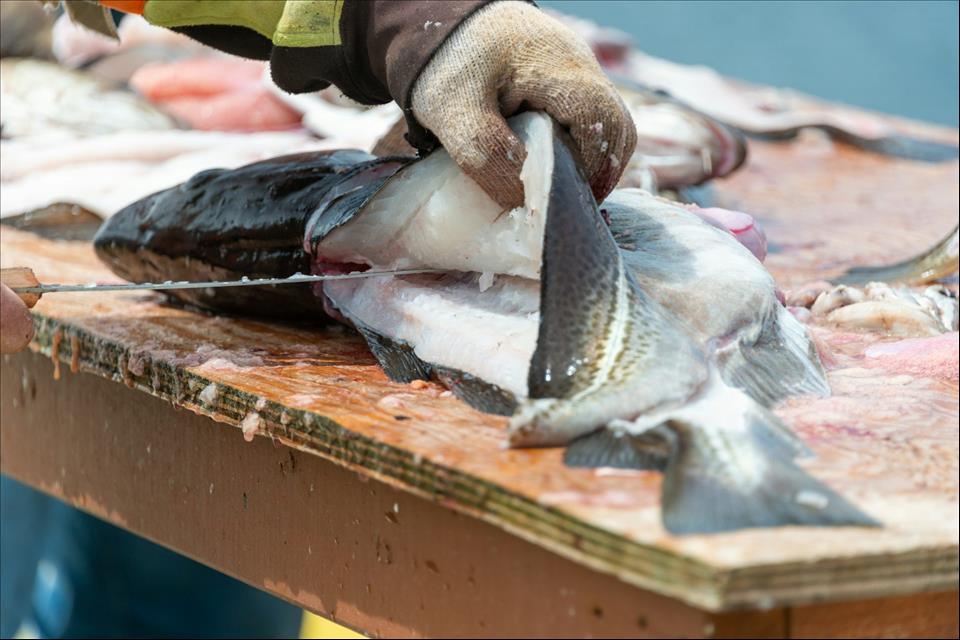
Why Canada's Decision To Lift A Ban On Cod Fishing In Newfoundland After 32 Years Is So Controversial Podcast
The decision was controversial and in this week's episode of The Conversation Weekly podcast we speak to a fisheries expert to shed light on what's happened. It offers a cautionary tale for those politicians trying to balance the complex demands of protecting ecosystems that also support substantial economies.
Newfoundland is a sleepy place with colourful wooden houses and icebergs that pass by its northern shores in early summer. The island is perched out in the north Atlantic near the grand banks, some of the most prolific fishing waters in the world.
Fishing has been the backbone of the economy for centuries, and so when the Canadian government imposed a cod moratorium in 1992 it had a huge impact, with an estimated 30,000 people in Newfoundland and Labrador out of work overnight . Some cod fishing was permitted in inshore waters from the late 1990s in boats less than 20 metres long, but all commercial offshore trawler fishing was prohibited.
A number of factors led to the decline of the cod population, but the most significant was overfishing, explains Tyler Eddy, a research scientist in fisheries science at Memorial University of Newfoundland.
The expectation was that the moratorium would last for a few years, enough for the cod stocks to recover. But that didn't happen, explained Eddy.
Inshore fishermen had continued to cod throughout much of the moratoirum period, and they're angry at the decision to reopen fishing to offshore trawlers. Ramon Cliff/Shutterstock Moving goalposts
There was a little uptick in 2016, but the recovery stalled. Then, in 2023, a new historical dataset tracking how many baby cod made it to adulthood back in the boom years of the 1960s was introduced into the annual assessment of the cod stocks .
The effect, explains Eddy, who was one of the scientists involved in the decision, was to reduce what experts believed the cod population could recover to. It also lowered the reference points for whether a stock is in the critical, cautious or healthy zone.
And this is what happened: the 2024 assessment of cod stocks using this new dataset put cod in the cautious zone, rather than the critical zone.
In June, the Canadian government used this shift to justify lifting the moratorium. It increased the total allowable catch for the year from 13,000 to 18,000 tonnes and reopened some cod fishing in offshore waters in 2024, including to some international trawlers.
It's since emerged that this decision went against the scientific advice of officials within Fisheries and Oceans Canada, the department which manages fishing. They had recommended maintaining the existing level of total allowable catch and continuing to limit it to inshore fishers.
A spokesperson for Fisheries and Oceans Canada told The Conversation that it makes fishery decisions informed by the best available science and a range of other factors, including socioeconomic considerations.
Newfoundland is now waiting until early 2025 when the next stock assessment of the Atlantic cod takes place, to see what the impact will be. Eddy explained how finely balanced the situation is:
Listen to the full episode on The Conversation Weekly podcast, which also includes an introduction from Harris Kuemmerle, environment and energy editor at The Conversation Canada.
This episode of The Conversation Weekly was produced by Gemma Ware and Katie Flood with assistance from Mend Mariwany. Sound design was by Michelle Macklem, and our theme music is by Neeta Sarl.
Newsclips in this episode from CBC News NL - Newfoundland and Labrador , CTV Your Morning and CBC News .
You can find us on Instagram at theconversationdotcom or via e-mail . You can also subscribe to The Conversation's free daily e-mail here .
Listen to The Conversation Weekly via any of the apps listed above, download it directly via our RSS feed or find out how else to listen here .

Legal Disclaimer:
MENAFN provides the
information “as is” without warranty of any kind. We do not accept
any responsibility or liability for the accuracy, content, images,
videos, licenses, completeness, legality, or reliability of the information
contained in this article. If you have any complaints or copyright
issues related to this article, kindly contact the provider above.
















Comments
No comment